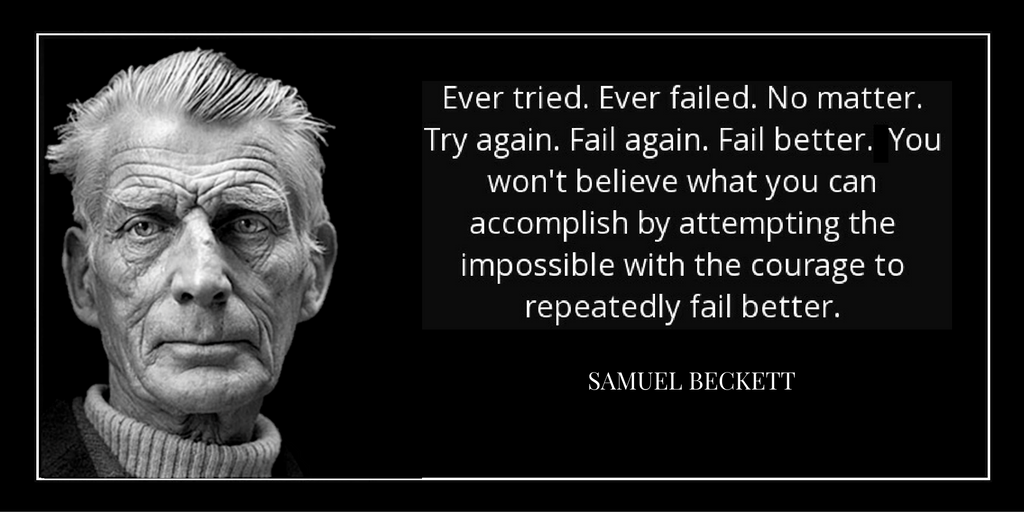I've written several times before about how trying to do too much can be a major source of stress. We set ourselves impossible targets, often because we feel that's what's expected of us, fail to reach them, and feel bad about ourselves.
The keyword there is failure. Failure isn’t inherently bad: we can learn a lot from failing. Arguably, failing is how we learn. We try something, it doesn't work, we try again, and this time we do better.1
However, constant failure rapidly becomes draining. After a while, we no longer learn from failure.2 Not only that, but if we begin to accept failure as normal, we stop caring about whether we succeed or fail. In fact, according to researchers at Berkeley, the evidence suggests that most people struggle to learn from their mistakes.3 Eventually, this becomes chronic pessimism - we expect to fail, and so we don’t bother trying any more.4
Paradoxically, one of the most effective ways to address this is to set out to do less. This results in a completely different mindset, which will probably result in you actually achieving more, as well as reducing stress.5 The trick is to redefine your goals so that they are realistic and achievable, and then get into the habit of hitting or exceeding every single target you set for yourself.6
Part of the reason for this is that dopamine is critical for neuroplasticity. In order to learn new skills or new habits, they need to be associated with a reward. In other words, while we can learn intellectually from failure, we create new neural pathways based the pleasure we get from our successes.7
Let me give an example. Say I set out to read fifty books in a month: even though I read fast, I’ll almost certainly fail. I’ll probably manage fifteen or twenty (which is pretty damn good by most people’s standards), but instead of feeling good about myself, I'll be disappointed because I'm so far short of that unattainable target. So next month I try again and fail again, and again, and again, and after a few months, that target becomes meaningless. I know I'm never going to achieve it, so I'm probably not even going to try.
But what if I set myself a target of reading twenty books a month? That's achievable. Some months I'll make it: other months I won't. That's better, but I'm still telling myself it's okay to fail. If I don't make it, I won't really care, because realistically, I never expected to be able to do it every month.
But what if I set myself a goal of just ten books a month? I'd sail past this. Some months I might only beat my goal by 50%. Other months I'll hit double my target or maybe more. Now every single month I get to feel good about myself, which gives me the motivation to keep going. Once I know I can comfortably hit that target every month I can make a stretch goal. I will do ten a month but I'll try for twenty. If I don't make it to twenty, that's fine, as long as I made it to ten. That's what I promised myself I would do and that's what I do, every single month, without fail. And at the end of the year, even if I only hit my minimum, I’ll have read at least one hundred and twenty books!
But most importantly, I’m training myself to visualize myself as a person who always achieves what he set out to achieve. I know I’m not going to achieve everything I would like to achieve, but once I make a commitment to myself to actually do something, that’s pretty much a done deal.
Success breeds success
This is one of the techniques I teach when I'm coaching managers. Be very clear about what you can realistically do and then guarantee that you will do that. Everything else is a stretch goal: if you make it, that’s great, but don’t make promises you can’t keep - to yourself or anyone else. Not only does this help you get clarity in your own life, but it helps people rely on you. They know that if you said you're going to do something, you will do it.
You can apply this to just about any aspect of your life. Don't promise yourself you're going to go to the gym or meditate or make a healthy breakfast or work on your novel every day if you can only realistically do five days a week most weeks. You're just giving yourself permission to miss your targets by asking yourself to do something unrealistic.
So instead, set out to do whatever it is just four times a week. If you make five, six, or the whole seven, that's great. Every time you hit that goal, you’re telling yourself that this lifestyle change isn’t something you aspire to - it’s something you have already achieved. Once you can comfortably hit that goal, every single time, you can set yourself a new one, and be confident that you will achieve that too - because you’re a person who does not fail.
For example, I'd love to hike the Appalachian Trail, but I'm not going to set that as an immediate goal: it's just not realistic. I’m old and out of shape: I can walk five or six miles comfortably, I can do ten or twelve at a push, but there's absolutely no way I'm up for a couple of thousand miles of hiking over rough territory carrying everything with me.
If that's something I seriously decide to do, I'm going to have to set a lot of intermediate goals first. Gradually increase the distance I walk so that I can do ten or twelve miles every weekend, then step it up to twice a week, and go from there. Start taking overnight trips, getting used to carrying a tent and some food. Start walking on more challenging trails, instead of the easy to at once I usually do. Bit by bit, if I stick at it, I'll build up my stamina, my strength, my skill, and my knowledge. Eventually, maybe, one day, I'll be ready for that long walk. Or maybe I won’t. But if I ever get to the point where I can walk a hundred miles of the Appalachian Trail and end up on top of Mount Katahdin, I’ll be damn pleased with myself.
Setting realistic goals is a great way to reduce stress.8 It means that when you've done all the things you set out to do, you can choose to stop because you've done enough. You don't have to keep pushing yourself beyond the bounds of what's reasonable. And of course this doesn't mean you should stop pushing yourself. You just have to be reasonable about it and take things step by step.
I'm not a doctor, dietitian, nutritionist, therapist, psychologist, psychiatrist, meditation trainer, yoga teacher, or anything else. My academic background is in anthropology, and I've taken some neuroscience courses, but otherwise I'm self-educated. Nothing in this blog constitutes professional advice.
Is Failure Good for Exploration and Learning? UCLA Center for the Developing Adolescent, 2022
“A recent study investigated how cardiothoracic surgeons learn from failures, revealing that there is a threshold beyond which they no longer gain knowledge from their mistakes.” Do We Really Learn From Failure?, Neuroscience News, 2024
How to Learn From Your Failures, Greater Good, 2022
Cognitive Processes in Response to Goal Failure: A Study of Ruminative Thought and its Affective Consequences. Journal of Social and Clinical Psychology, 2013
Mental health recovery, goal setting and working alliance in an Australian community-managed organisation. Health Psychology Open, 2018
How Setting Goals Can Positively Impact Our Mental Health, Charlie Health, 2023
Growth Mindset: The Science of Failure and Neuroplasticity, James Egerton, 2021
The Importance, Benefits, and Value of Goal Setting, Positive Psychology, 2024




